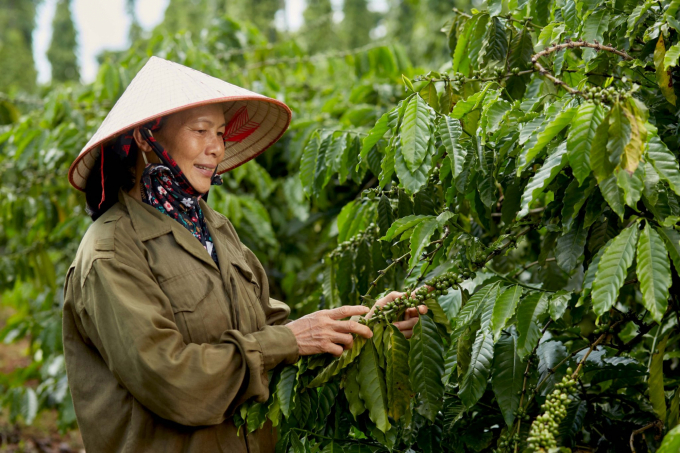May 30, 2025 | 05:19 GMT +7
May 30, 2025 | 05:19 GMT +7
Hotline: 0913.378.918
May 30, 2025 | 05:19 GMT +7
Hotline: 0913.378.918

Nestlé Vietnam CEO Binu Jacob.
Nestlé Group officially returned to Vietnam with the establishment of Nestlé Vietnam in 1995 and continuously expanded investment and diversified products. Up to now Nestlé's total investment capital in Vietnam has reached USD 730 million.
Nestlé pioneers activities towards regenerative agriculture through the NESCAFÉ Plan in Vietnam. Since its launch in 2011, NESCAFÉ Plan has distributed more than 53 million high-yielding, drought-resistant coffee seedlings to farmers and rehabilitated 53,000 ha of coffee in the Central Highlands. The project also organized more than 300,000 training courses on sustainable coffee farming techniques for 300,000 farmers, helping 21,000 farmers achieve 4C international coffee certification.
Through the NESCAFÉ Plan, our agricultural engineers have collaborated with domestic and foreign scientific organizations and agricultural experts to carry out the following specific actions:
Protect soil health and color: Regenerative farming practices contribute to soil protection by reducing the amount of inorganic fertilizers, increasing the use of organic fertilizers and composting from coffee husks and post-harvest by-products. By applying this farming method, farmers can reduce about 20-30% of inorganic fertilizers, thereby improving fertility and improving soil health.
Protect groundwater resources: Regenerative farming practices help protect increasingly scarce groundwater resources. The NESCAFÉ Plan project has introduced water-saving irrigation techniques including drip irrigation, sprinkler irrigation or using a simple, easy to find and inexpensive tools such as cow milk cans or plastic water bottles to measure the moisture level in the soil. These measures help farmers save 40%-60% of the water required to irrigate coffee trees compared to before.
Protect biodiversity: Nestlé Vietnam develops regenerative agriculture with a reasonable intercropping model such as growing pepper with coffee. In particular, pepper is a shade tree and a windbreak, so if only 30% of pepper trees are intercropped into a coffee garden, the amount of carbon absorbed into the soil will be higher than the emission.
Nestlé Vietnam has cooperated with the Western Highlands Agriculture and Forestry Science Institute (WASI) to produce new high-yielding, pest and drought resistant coffee varieties to distribute to farmers. The use of healthy, disease-free coffee varieties, combined with a reasonable intercropping model, contributes to improving farmers' incomes as well as ensuring a supply of good quality coffee for Nestlé Vietnam's factories.
Reduce greenhouse gas emissions in coffee farming: Nestlé Vietnam work with international organizations to manage greenhouse gas emissions in coffee farming and aim to reduce the emission rate in coffee farming to the lowest possible. All of the above activities are aimed at contributing toward the goal of net-zero emissions in agriculture.
I believe the Government, MARD and localities in Vietnam are increasingly paying attention to sustainable agriculture. Agro-products are also produced in a more responsible manner. This is a very encouraging thing and also the right direction for future development.

Farmers actively participate in the NESCAFÉ Plan.
In order to promote green, sustainable and responsible agricultural models, we need to start with the basics, which are changing farming mindset, farming habits, and organizing and support mechanisms.
This thus calls for policies to support and encourage more and more farmers and communities to transition from less sustainable production methods to more modern and sustainable production methods, helping to conserve, restore, and regenerate the land and ecosystems associated with these new methods.
Management agencies need to perfect the mechanism and application of biological plant protection drugs, apply digital transformation in the management of guidelines for effective, safe and responsible use of pesticides, strengthen public-private cooperation in production, replicate farming models to reduce production costs while ensuring productivity and agro-products quality, and promote the reorganization of commodity sectors in agroproduction.
Nestlé is ready to work with our partners to realize these goals toward a green and regenerative agriculture. With a long-term commitment we have been working closely with coffee farmers for over 11 years. We will continue to support farmers in the Central Highlands with more sustainable farming knowledge, improve the quality of Vietnamese coffee beans, and promote regenerative agriculture through the NESCAFÉ Plan.
I believe the Vietnam market can completely become a production center for packaged food and beverage products for the whole world thanks to a skilled workforce and high work ethic. One thing to note is that Nestlé Vietnam's operating system is currently among the most efficient and flexible in all markets in which Nestlé is present.
Translated by Samuel Pham
/2025/05/25/4127-3-073637_820.jpg)
(VAN) Thanks to the promotion from an FAO-implemented project, vegetable production in greenhouses in Moc Chau has seen strong development, from 1.5 hectares in 2021 to nearly 50 hectares in 2024.

(VAN) FAO has recently supported USD 140,000 to implement the project 'Risk mitigation human-animal interface risks through disease control initiatives in pig farming.'

(VAN) The People's Committee of Tra Vinh province has approved an adjustment to the investment policy for the Green Hydrogen Plant project, increasing its area to approximately 52.76 hectares.
![Reducing emissions from rice fields: [2] Farmers’ commitment to the soil](https://t.ex-cdn.com/nongnghiepmoitruong.vn/608w/files/news/2025/05/05/dsc08881jpg-nongnghiep-140632.jpg)
(VAN) Clean rice cultivation model in Thuong Tan commune, Bac Tan Uyen district, is assisting local residents in achieving sustainable agriculture by substantially reducing costs, increasing productivity, and protecting the environment.

(VAN) At the conference to disseminate Resolution No. 68, AgriS introduced its digital agricultural ecosystem and reaffirmed its commitment to accompanying the Government in promoting private sector development and sustainable agriculture.

(VAN) 'Blue Ocean - Blue Foods' initiative is designed to restore marine ecosystems and establish sustainable livelihoods for local communities by cultivating a minimum of 1,000 hectares of cottonii seaweed in the first three years.
/2025/05/21/4642-3-112707_603.jpg)
(VAN) The V-SCOPE project has made direct contributions to three out of six pillars of the Comprehensive Strategic Partnership between Vietnam and Australia.